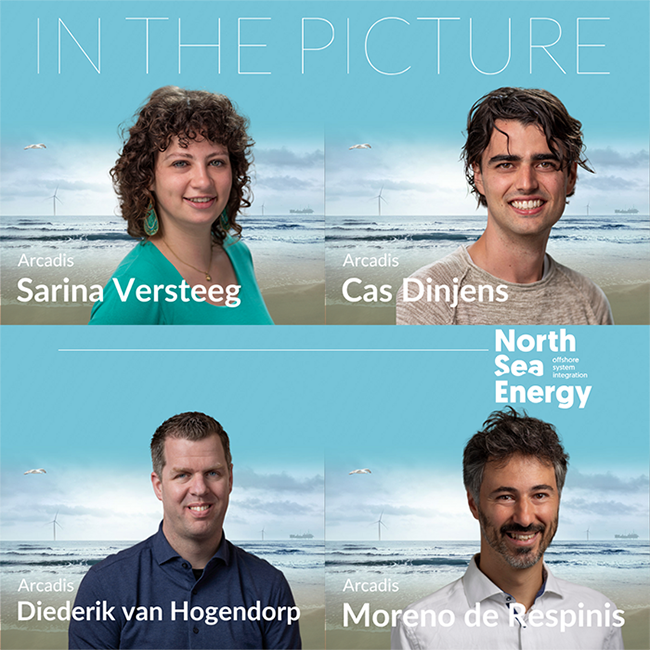Partner in the Picture: Arcadis Nederland
May 12, 2025
At Arcadis, we’re driving the energy transition forward—fast
As a prominent partner in the NSE program, we interviewed Arcadis’ core-members of the NSE-team: Diederik van Hogendorp (project manager offshore wind), Sarina Versteeg and Cas Dinjens (marine ecologists) and Moreno de Respinis (Senior Consultant Energy Transition Strategy & Policy).
Can you describe Arcadis’ core activity and your roles in NSE?
“Arcadis is a global leader in intelligence-driven sustainable design, engineering, and consultancy. We create resilient, innovative, future-ready environments that benefit both people and the planet. Within the North Sea Energy Program, we contribute expertise in offshore wind, marine ecology, and energy transition strategy—drawing on our strengths in project management, spatial planning, and biodiversity to support integrated, sustainable solutions.”
What is Arcadis’ ambition and role in the energy transition?
“Our ambition is clear: to lead the shift toward a low-carbon future by delivering sustainable, real-world solutions that make a global impact. As a leader in design, engineering, and consultancy, we help clients develop forward-thinking infrastructure, modernize energy systems, and seamlessly integrate clean technologies into both natural and urban environments. With deep expertise and a passion for innovation, we’re building resilient, future-ready energy solutions that empower communities and protect the planet.”
How does Arcadis contribute to offshore system integration and what role do you aspire?
“Arcadis is shaping the future of offshore system integration through specialized engineering and sustainable solutions. We support projects like TenneT’s offshore grid connections, combining technical design with strategic process management, environmental impact assessments (EIAs), and permit applications for offshore wind. As a key contributor to VAWOZ (Verkenning Aanlanding Wind Op Zee), we help develop innovative, environmentally responsible landing solutions. With multidisciplinary expertise, we bridge technology, nature, and society to deliver resilient, integrated offshore systems.”
Having joined in 2023, what were the main drivers to take part in the NSE programme and what are your expectations?
“With a strong presence across the North Sea region across the UK, Belgium, Germany, and the Netherlands, Arcadis was naturally drawn to the North Sea Energy Program. Our focus on the energy transition aligns closely with NSE’s goals, making the partnership a perfect fit. We welcomed the opportunity to collaborate with leading experts and institutions, share knowledge, and actively contribute to sustainable offshore solutions. The program’s structure and our role within it matched our expertise—and our commitment is fully backed by Arcadis leadership, global energy transition director @Hendrik Jan Bakhuizen and European resilience director @Niels Schallenberg.“
In which work packages do you participate and what are your take aways so far?
“Arcadis is involved in 3 work packages focusing on ecological protection, spatial efficiency, and energy system integration in the North Sea.
*In WP4 – Nature-Inclusive Spatial Design, we assess the ecological impacts—both positive and negative—of the proposed Hub North energy hub, located in a biodiverse area with minimal human activity. Our focus is on avoiding and reducing impacts through a nature-inclusive spatial design. We recommend an adaptive, knowledge-based approach to spatial planning, aligned with future offshore wind development beyond 2032. Key research gaps include the effects of floating solar, hydrogen production, and cumulative ecological impacts on the North Sea’s carrying capacity.
*In WP6 – Synergistic Multi-Use, we look at the intense competition for space, requiring a smarter multi-use of offshore areas. Our goal is to co-locate activities in ways that reduce ecological pressure and enhance economic synergies—such as shared infrastructure across sectors. By learning from best practices and embracing innovation, the North Sea can lead in integrating nature, energy, and food production transitions.
*In WP7 – Energy System Scenarios 2050, we contribute to a whitepaper exploring pathways for integrating electricity, hydrogen, natural gas, and CO₂ systems in the Dutch North Sea by 2050. Offshore integration is crucial to achieving a decentralized, efficient, and low-carbon energy system. The North Sea has the potential to become a clean energy hub and a model for synergistic multi-use of space, delivering not only energy security and emissions cuts but also broader benefits—such as biodiversity gains, sustainable food systems, and circular economy opportunities.
To enhance the participatory process, we interview NSE participants, representatives from politics, policy and administration, and stakeholders from the sector to share their vision on the role of the North Sea in the energy transition and the opportunities and challenges they see for system integration.
